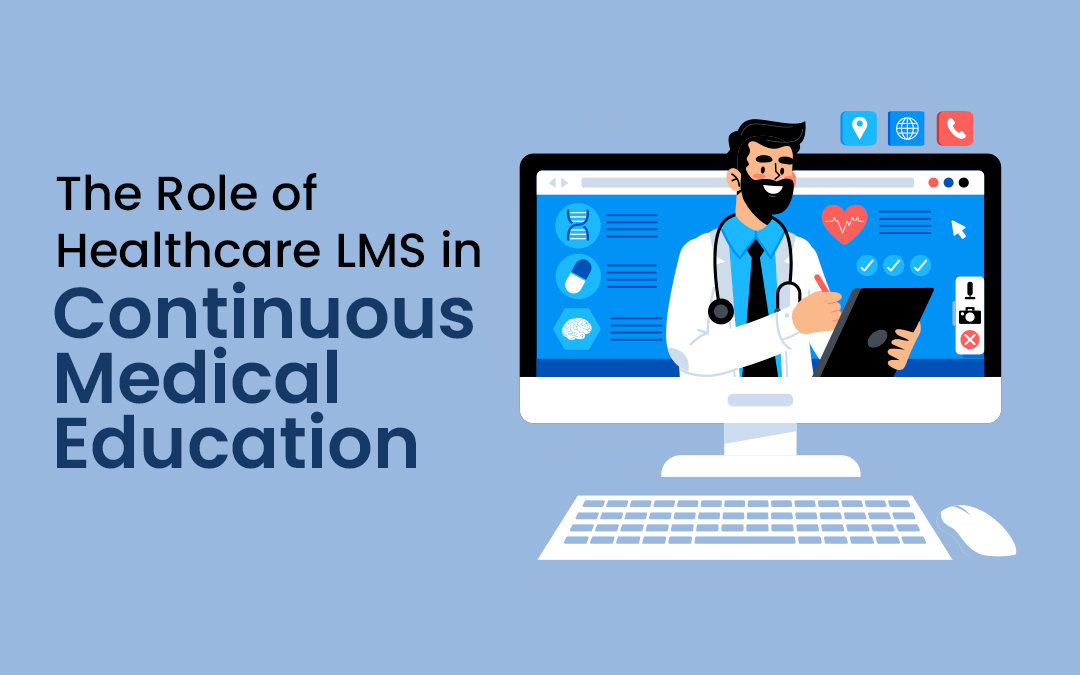
Ongoing medical education is crucial for keeping healthcare professionals abreast of the developments in their field to ensure that doctors and nurses are well informed about new research findings and advancements in treatments and technologies. Using a Learning Management System (LMS) is a highly effective method for continuous medical education, leveraging technology to transform how medical professionals acquire knowledge and stay updated. This article delves into the importance of a healthcare Learning Management System (LMS) in medical education.
1. Accessibility: Breaking Down Barriers
In the past, learning meant going to conferences or workshops, which usually involved travel and time away from work. Moreover, healthcare workers who are always busy find it hard to make time for education because of their hectic schedules. A healthcare LMS makes learning available to everyone of where they are or their daily schedules. Healthcare workers can easily access training courses on any device connected to the internet whenever it suits them best. Be it during breaks, at work, or during late-night study sessions. This flexibility allows individuals to learn at their speed and convenience.
2. Customization: Tailored Learning Experiences
Doctors and nurses possess areas of specialization and diverse ways of acquiring knowledge, making it important to tailor education to each individual's specific requirements. An online medical training platform tackles this challenge by providing learning opportunities for healthcare professionals to select courses tailored to their field and skill level. The platform adjusts the content based on each individual's knowledge gaps and learning preferences, such as images, videos, quizzes, or engaging simulations. Tailoring educational materials to meet the needs of each student allows a healthcare Learning Management System (LMS) to boost involvement and enhance comprehensive comprehension and information retention.
3. Collaboration: Peer-to-Peer Learning
Learning doesn't just happen in structured classes. Interactions with peers also contribute significantly to the process. By working and talking about difficult situations or sharing personal insights and expertise, participants can benefit from a rich exchange of knowledge and resources. An effective healthcare learning management system (LMS) integrates elements such as online discussions, leaderboards, and virtual classrooms to encourage collaboration among medical professionals and promote worldwide networking within the industry community.
4. Assessment: Measuring Competency
To ensure that ongoing learning remains successful in the field, it's important to evaluate healthcare professionals' skills regularly. To accomplish this goal, the usual practice involves conducting face-to-face assessments or exams at regular intervals. Healthcare learning management system (LMS) platforms feature various assessment tools that evaluate learners’ comprehension levels. These tools include quizzes and tests as well as case studies and simulations to offer prompt feedback on each learner’s advancement. By using tracking tools integrated into an LMS to evaluate each student's progress individually, teachers can adjust upcoming course material to better cater to the needs of the learners.
5. Continuing Professional Development: Staying Compliant
Healthcare providers must adhere to accreditation standards to earn CPD credits or recertification as part of their professional development efforts. An online healthcare learning platform allows users to keep tabs on their professional development tasks effectively. Users can record the courses they finish and create reports that fulfill the accreditation standards, instilling trust in learners and regulatory authorities that they meet the prerequisites to uphold top-notch professional integrity.
6. Centralized Information Repository: A Knowledge Hub
Keeping abreast of knowledge is a constant struggle for healthcare providers due to the continuous evolution of information in the field. An online healthcare learning management system offers a hub where every student can easily access the latest resources, including research articles, clinical guidelines, and updates on protocols—all important information neatly organized in a single user-friendly platform. Medical professionals now have access to up-to-date information via an LMS platform instead of depending solely on old textbooks or offline sources for new knowledge, empowering them to deliver top-notch care to their patients more effectively.
Conclusion
In the field of healthcare, education technology known as a learning management system (LMS) provides several advantages. It allows easy access to information and resources tailored to individual needs and preferences. Additionally, it enables collaboration among users and offers tools for evaluation and tracking adherence to regulations. The LMS serves as a central hub for storing essential data.
Healthcare institutions that incorporate an LMS into their training initiatives equip their staff with the resources needed to stay current with the latest developments in medicine. Continual learning plays a crucial role in ensuring top-notch patient care. E-Learning solutions are transforming how healthcare professionals engage with educational opportunities and career growth.
Share this post
Leave a comment
All comments are moderated. Spammy and bot submitted comments are deleted. Please submit the comments that are helpful to others, and we'll approve your comments. A comment that includes outbound link will only be approved if the content is relevant to the topic, and has some value to our readers.

Comments (0)
No comment